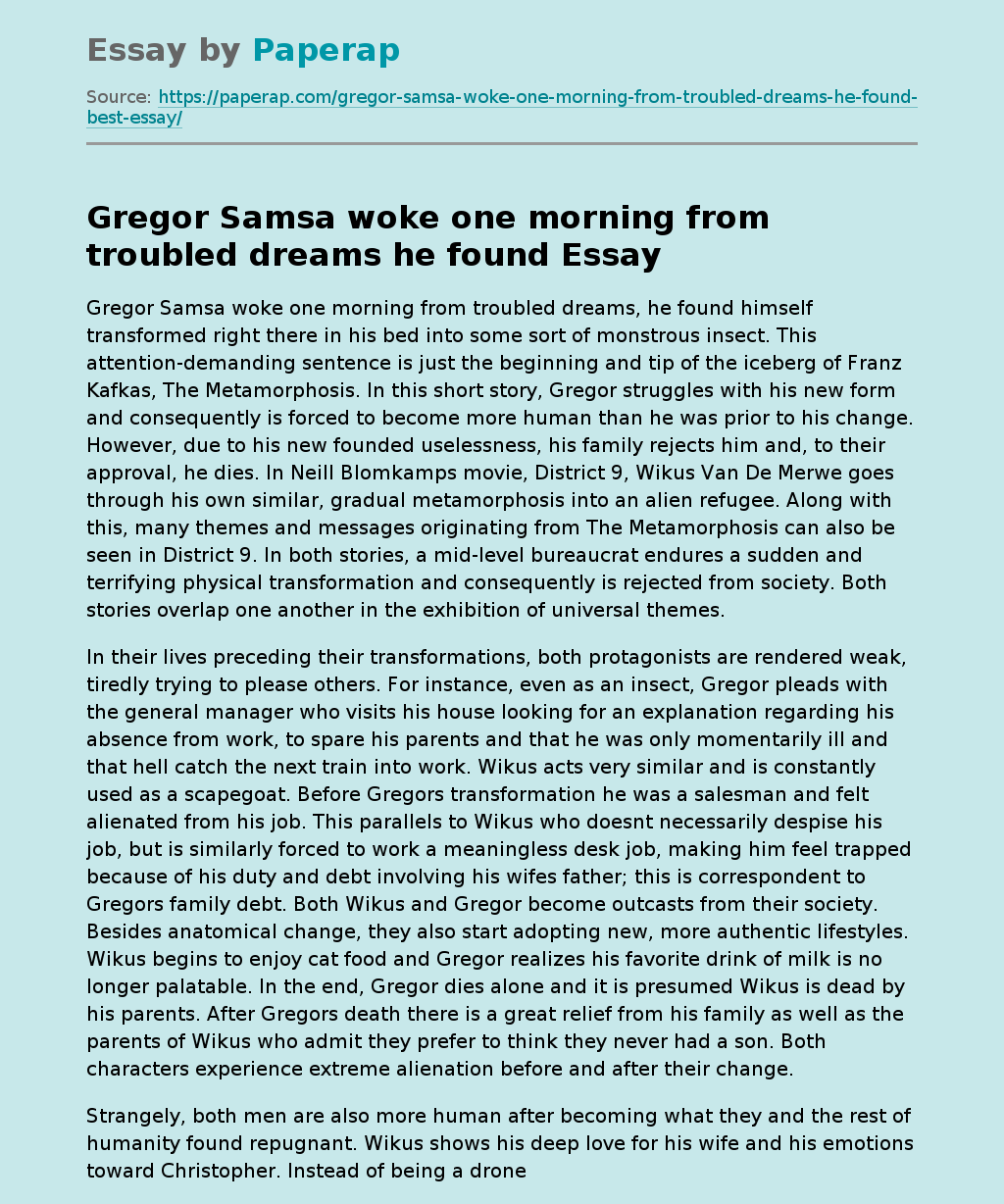Gregor Samsa woke one morning from troubled dreams he found
Gregor Samsa woke one morning from troubled dreams, he found himself transformed right there in his bed into some sort of monstrous insect. This attention-demanding sentence is just the beginning and tip of the iceberg of Franz Kafkas, The Metamorphosis. In this short story, Gregor struggles with his new form and consequently is forced to become more human than he was prior to his change. However, due to his new founded uselessness, his family rejects him and, to their approval, he dies.
In Neill Blomkamps movie, District 9, Wikus Van De Merwe goes through his own similar, gradual metamorphosis into an alien refugee. Along with this, many themes and messages originating from The Metamorphosis can also be seen in District 9. In both stories, a mid-level bureaucrat endures a sudden and terrifying physical transformation and consequently is rejected from society. Both stories overlap one another in the exhibition of universal themes.
In their lives preceding their transformations, both protagonists are rendered weak, tiredly trying to please others.
For instance, even as an insect, Gregor pleads with the general manager who visits his house looking for an explanation regarding his absence from work, to spare his parents and that he was only momentarily ill and that hell catch the next train into work. Wikus acts very similar and is constantly used as a scapegoat. Before Gregors transformation he was a salesman and felt alienated from his job. This parallels to Wikus who doesnt necessarily despise his job, but is similarly forced to work a meaningless desk job, making him feel trapped because of his duty and debt involving his wifes father; this is correspondent to Gregors family debt.
Both Wikus and Gregor become outcasts from their society. Besides anatomical change, they also start adopting new, more authentic lifestyles. Wikus begins to enjoy cat food and Gregor realizes his favorite drink of milk is no longer palatable. In the end, Gregor dies alone and it is presumed Wikus is dead by his parents. After Gregors death there is a great relief from his family as well as the parents of Wikus who admit they prefer to think they never had a son. Both characters experience extreme alienation before and after their change.
Strangely, both men are also more human after becoming what they and the rest of humanity found repugnant. Wikus shows his deep love for his wife and his emotions toward Christopher. Instead of being a drone, living behind a desk with no agency, he takes action and fights back. As seen in the paramount violin-scene, Gregor is shown to be the most human in the room as he truly appreciates his sisters music. Despite this, due to his family progressively dehumanizing him, he eventually dies a sorrowful, hive-minded death. Gregor felt stuck with a life he loathed and he died for the betterment of that life, rather than embracing the opportunity to gain his own authentic fulfillment, like Wikus.
Both works are primarily interested not in the bizarre process of a person becoming a monstrous being, but in the inner-workings of that persons head as the transformation takes place. Kafka spends copious amounts of time describing in great detail Gregors mental anguish. Similarly, in District 9, huge portions of the film are comprised of close-up shots of the lead actors face as he endures horror after horror at the hands of other human beings. Kafka and Blomkamp both focus on the individual alienation driven from one’s society and the consequences.
Gregor Samsa woke one morning from troubled dreams he found. (2019, Nov 19). Retrieved from https://paperap.com/gregor-samsa-woke-one-morning-from-troubled-dreams-he-found-best-essay/

